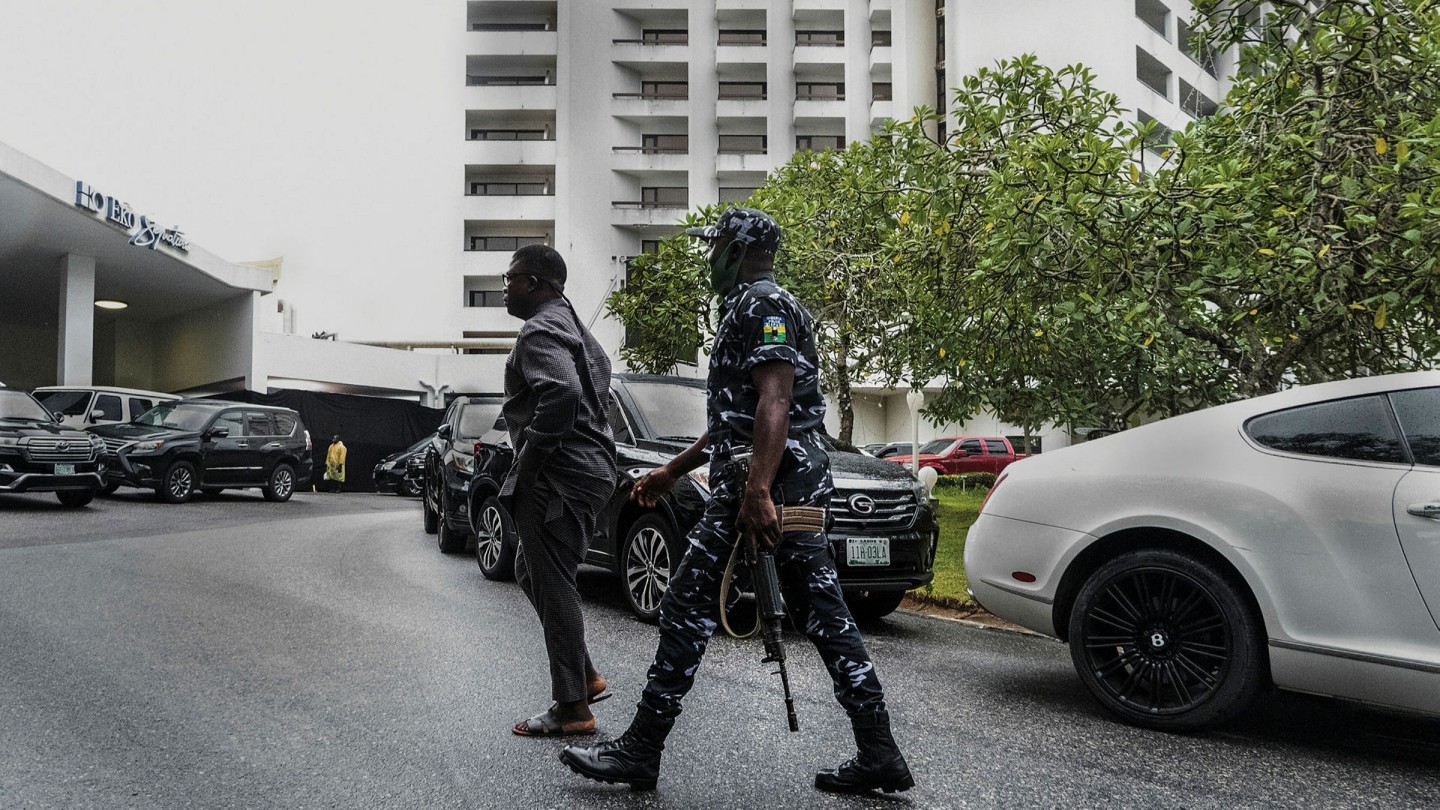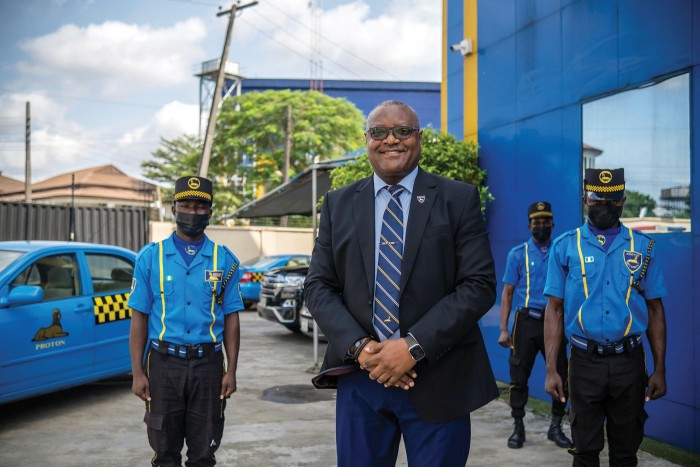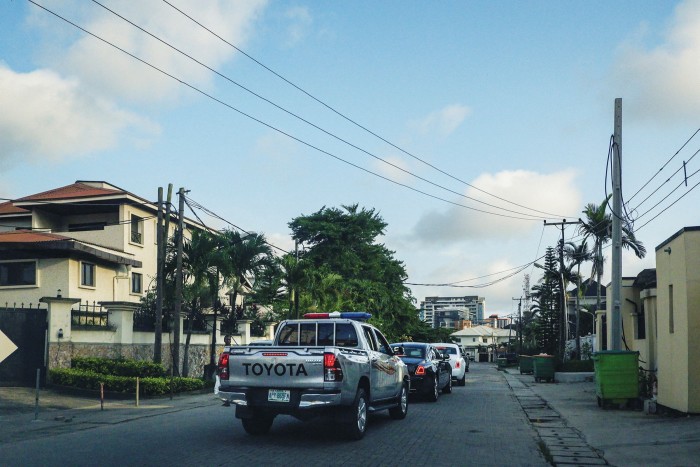Gun for hire: Nigeria security fears spark boom in private protection

Roula Khalaf, Editor of the FT, selects her favourite stories in this weekly newsletter.
The white Toyota Hilux pickup truck pulls up hard at a roundabout in Ikoyi, a district of Lagos, Africa’s biggest city. The driver hits the horn — an aggressive, deafening bark — at the car he is now two inches away from. A big man has arrived and the message is simple: make way.
The knot of traffic swirling around the digital billboard in the centre of the roundabout begins to loosen. The big man — or woman, or their child and nanny — is seated in the vehicle behind the Hilux: a black Mercedes G-Wagen SUV with tinted windows, which is trailed by another truck in a quasi-military shade of brownish-green. Inside are police officers, on secondment to a private security company. One leans out, AK-47 in hand, and slaps the bonnet of the car alongside. The message is clearer because he shouts it: “Move. Now.”
More laconic looking police officers can be found outside every fancy apartment building in Lagos. They typically hold assault rifles by their trucks, which are usually parked next to the armoured Mercedes, Range Rovers or Toyota Land Cruisers their bosses drive. When the big man comes out, the officers mount up, sirens blaring, and cut through the Lagos traffic like a knife, pounding on the bonnets of cars as they pass. As the security situation worsens across Nigeria, escort and guard services for wealthy clients in Lagos are booming. By one count, about 40 per cent of the country’s police officers are working for private services.
“Nigeria is going through this serious insecurity now,” says Ademola Onalaja, managing director of Proton Security Services, one of the country’s biggest private security companies. It employs some 9,000 guards, not counting police officers on secondment. “And so the protection of VIPs and national assets is paramount to the survival and economic growth of the country.”

The coronavirus pandemic hit Nigeria’s private security industry hard. Companies that require guards shut down, moved to remote work or scaled back operations; lucrative contracts to protect expatriates were cancelled as multinationals withdrew staff; the pandemic-induced oil price crash caused a brief recession amid generally sluggish growth; and many businesses — which are also potential clients — became cautious about spending money.
The pandemic also came amid a general deterioration in security, with violence spreading to nearly every corner of the country, from the Islamist Boko Haram insurgency in the north-east to a resurgent separatist movement in the south-east. An epidemic of kidnapping (the term many Nigerians use is “banditry”) that began in the north-west is now widespread in Nigeria, rendering many of its roads and highways all but impassable.
But “our business has grown”, says Onalaja, a retired army colonel. The north-west and north-east, both hotspots of insecurity, have driven some of that growth, while the spread of the kidnapping threat toward the south-west — where Lagos is situated — means “you are finding VIPs also seeking more protection services . . . now they want to be 24/7 covered”, says Onalaja.
Because private guards are not permitted to carry guns in Nigeria, the companies — including the local subsidiaries of foreign-owned groups — strike agreements with the national police, which provides armed officers to ride in trucks provided by the companies, under the supervision of a private security commander.
Many of the officers guarding wealthy people are from the Mobile Police (known as Mopol), a paramilitary unit — originally riot squads — of the Nigerian Police Force. Police escorts are procured in one of two ways: via a private security company or, much more cheaply, directly at the local police station, which is the route that more and more middle-class Nigerians are taking for interstate trips as security threats have grown.
“Anyone can get access to these now — it’s not just politicians or VIPs — because of the high rate of insecurity . . . because you don’t want to run into armed bandits or kidnappers on the way,” says Kemi Okenyodo, executive director of the Rule of Law Empowerment Initiative, a non-governmental organisation involved in security governance.

The officers are paid a stipend — usually between N5,000 and N7,000 ($12-$17) a day, depending on rank — and the local command receives an administration fee. But these fees are largely paid in cash, says Okenyodo, a security and policing expert. “So this income that is being generated, how much does it come to at the end of the day?” she adds. “What is it used for? Because we still continue to complain that the police are not performing.”
The outsourcing of police for use by private companies took off at the height of the security crisis in the oil-rich Niger Delta in the second half of the 2000s, says Okenyodo. But where it was once ad hoc, it has now been institutionalised, with a VIP unit built into the police command structure.
In 2018, the then-chairman of the Police Service Commission, a civilian oversight body, said 150,000 of the country’s roughly 370,000 police officers were attached to VIPs, including wealthy people and former senior government officials. “We cannot afford to have [so much] of the population of the police in private hands,” Mike Okiro, who also served as inspector-general of police (IGP) between 2007 and 2009, told the state-run News Association of Nigeria at the time.
There is little indication that anything has changed. Successive IGPs have called for the withdrawal of police officers attached to the rich and powerful — including the latest incumbent, who in one of his first acts after his appointment in April issued such a directive, less than a year after his predecessor had done the same.
The Nigerian Police Force did not respond to multiple requests for comment.
Wale Olaoye, chief executive of Halogen, which with 25,000 employees is the country’s biggest private security company, says he understands the criticism that scarce police resources are being diverted. “In the future, the ideal situation is to license certain [qualified] companies to bear arms, so that we can create an executive protection unit out of private companies and release the [police] back to do what they do,” he says.
Both Olaoye and Onalaja say they hope the government will consider changing the rules. But Daniel Lemmer, director of commercial operations at Pilgrims Africa, part of a UK security group that has a subsidiary in Nigeria with about 2,500 employees, does not think that will happen. “[For] African leaders, if you do start arming them [private security staff], what stops them from overthrowing the country? There’s that fear,” he says.
“The other part is: how do you actually control all of those weapons? It will require a whole sort of mindset change. The army and the police lose enough weapons [during heated battles and when armories are raided by criminals]— I don’t think they can afford more weapons to be out in the open, out in the streets.”
Lemmer says he understands why people criticise the use of police for guarding wealthy Nigerians and foreigners. But he argues that they serve an essential economic purpose. “The police are definitely needed to escort the high-wealth individuals and the expatriates, because they need to feel secure coming into the country, coming to invest,” he says. “If they are left to their own devices and their first impression is, ‘I’m not getting protected, I feel vulnerable’, they may not come back.
“Can you imagine if your high-value clients and your visitors and investors do get kidnapped?” he adds. “If there was a spree of kidnapping, no one would return to Nigeria, so these guys are doing a great service for Nigeria.”
This article is part of FT Wealth, a section providing in-depth coverage of philanthropy, entrepreneurs, family offices, as well as alternative and impact investment
Comments